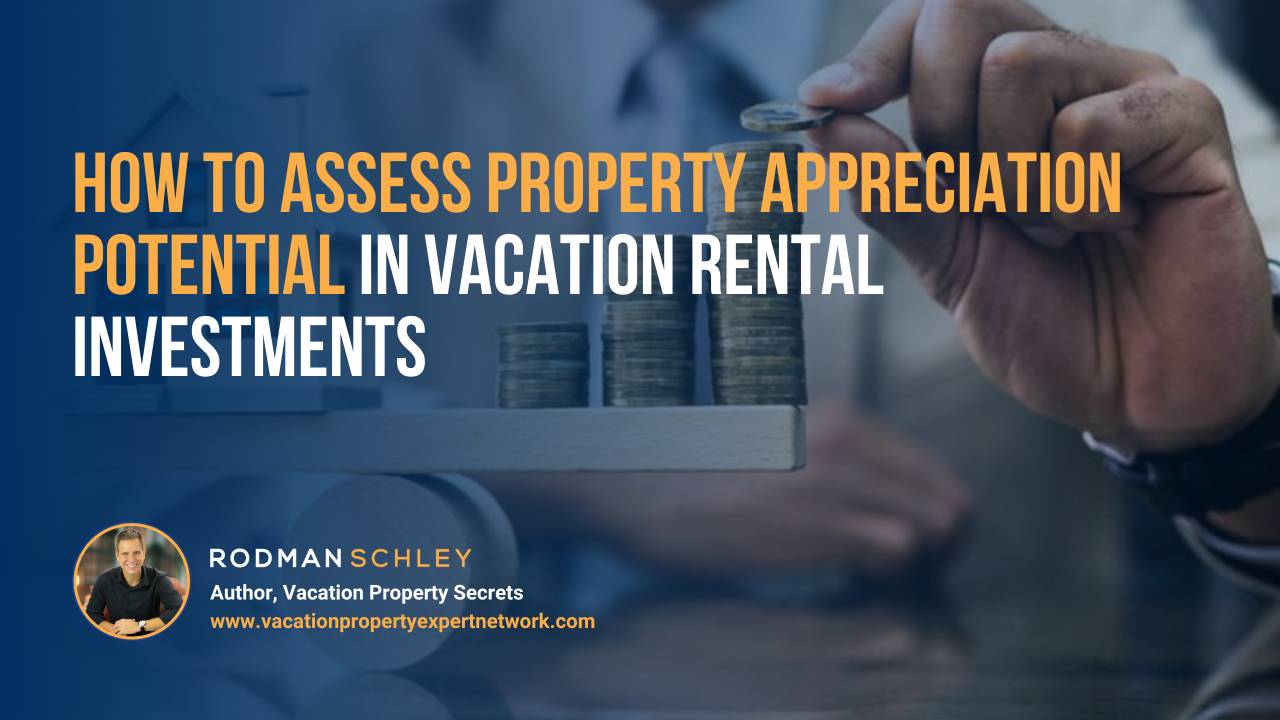
How to Assess Property Appreciation Potential in Vacation Rental Investments
When it comes to investing in vacation rentals, property appreciation is one of the most crucial factors in determining the long-term success of your investment. Appreciation refers to the increase in the property’s value over time, and understanding how to assess this potential is key to making informed investment decisions.
While vacation rentals can offer short-term rental income, property appreciation provides an opportunity to build wealth over the long term. In this blog post, we’ll explore how to assess property appreciation potential in vacation rental investments, helping you make better investment choices and maximize the return on your property.
Why Property Appreciation Matters in Vacation Rentals
Property appreciation is the process through which the value of a property increases over time, influenced by a variety of market factors. In vacation rental investments, property appreciation provides a long-term financial gain that can significantly boost your overall return on investment (ROI).
By understanding the potential for appreciation, you can make smarter investment choices that not only offer steady rental income but also increase in value over time. Property appreciation is particularly important in the context of vacation rentals, as it can provide a buffer against market downturns and offer a strong exit strategy if you choose to sell the property.
Key Factors That Impact Property Appreciation Potential
There are several key factors that can affect a vacation rental’s potential for appreciation. By analyzing these factors, you can better gauge whether your property will increase in value over time.
Location
The location of your vacation rental is the single most important factor influencing its appreciation potential. Properties located in highly desirable areas—such as popular tourist destinations, beachfront properties, or areas with high demand for vacation rentals—are more likely to experience significant appreciation.
How Location Affects Property Value:
- Tourist demand: Locations that attract a high volume of tourists will often see an increase in property values due to constant demand. Proximity to beaches, mountain resorts, historic sites, and other tourist destinations tends to keep property values on an upward trend.
- Infrastructure development: If a location is undergoing development, such as new roads, public transportation, or tourist attractions, this can lead to an increase in property values. Areas with improving infrastructure generally experience higher demand and property price increases.
- Neighborhood appeal: A neighborhood with growing amenities (e.g., restaurants, shops, and cultural attractions) will likely see property values rise, as the area becomes more desirable to visitors and potential homeowners.
Carefully research the local real estate trends to determine whether your chosen location is experiencing increased demand, new developments, or improving infrastructure. These factors can significantly enhance your property’s appreciation potential.
Local Market Trends and Economic Stability
The local economy plays a significant role in determining property appreciation. A thriving local economy with low unemployment rates, strong GDP growth, and consistent demand for vacation rentals contributes to sustained property value increases over time.
How to Assess Market Trends:
- Job market: A strong job market typically leads to higher disposable income, meaning more people can afford to travel and rent vacation properties. This contributes to a consistent demand for vacation rentals and can push property values higher.
- Real estate growth: If the area has seen property value increases over the past few years, it’s a good indicator that property values will continue to rise. Historical trends of increasing property values, along with a growing real estate market, suggest that the area has a solid foundation for appreciation.
- Economic stability: Invest in markets that are economically stable or have diversified economies (such as those with thriving tourism, real estate, technology, or entertainment industries). Areas with volatile economies may struggle to maintain consistent appreciation.
By analyzing the local economic health and real estate market trends, you can better predict whether the property’s value is likely to increase over time.
Development Plans and Future Growth
If your target location is experiencing significant development or planning for future growth, there’s a strong likelihood that property values will appreciate as the area becomes more desirable.
Types of Development to Watch For:
- Infrastructure projects: Projects like new airports, highways, or public transport systems can make an area more accessible, which leads to increased demand for vacation rentals and higher property values.
- Tourist attractions: New tourist attractions, such as theme parks, museums, or cultural centers, can drive foot traffic to an area and increase demand for vacation rentals.
- Commercial and residential developments: The construction of new hotels, retail spaces, and luxury homes in the area can significantly enhance the neighborhood’s appeal and increase property values.
Be sure to research local planning initiatives and future developments in the area. Properties in areas with strong future growth have a better chance of seeing long-term appreciation.
Property Condition and Upgrades
The condition of your property can also influence its potential for appreciation. Well-maintained properties or those that have been upgraded or renovated are more likely to appreciate faster and maintain their value over time.
How Property Condition Impacts Appreciation:
- Renovations and upgrades: Properties that are well-maintained or have undergone recent renovations (e.g., modernized kitchens, upgraded bathrooms, or new flooring) often see quicker appreciation than those that haven’t been updated.
- Curb appeal and exterior: The exterior and first impression of your property can make a significant difference. A fresh coat of paint, landscaping improvements, and updated exterior features make a property more desirable, which can result in higher appraisals and quicker appreciation.
- Luxury features: Adding luxury amenities such as a hot tub, swimming pool, or home theater can increase your property’s appeal and raise its value.
By keeping your property in excellent condition and making strategic upgrades, you can enhance its potential for both short-term rental income and long-term property value growth.
Compare with Comparable Properties (Comps)
When assessing potential property appreciation, it’s important to compare your property with similar properties in the area—commonly known as comps. Looking at the price trends of comparable vacation rentals gives you an idea of how much appreciation your property can expect in the future.
How to Compare with Comps:
- Price trends: Analyze comparable properties in the area that have recently sold or rented. If similar homes in the same neighborhood have appreciated over the past few years, your property is likely to experience similar gains.
- Amenities and size: Make sure you’re comparing properties of similar size and amenities. If your property is in the same location but offers more desirable features (e.g., a larger lot, better views, or more modern upgrades), it may appreciate faster than the comps.
By researching and comparing your property with similar ones, you can estimate your property’s potential for future appreciation.
Long-Term Investment Strategy and Market Timing
Vacation rentals can be highly profitable in the short term, but they also require a long-term view. Timing the market and having a solid investment strategy will increase the likelihood of your property appreciation over time.
How to Time the Market:
- Market cycles: Understanding the property market cycle (growth, stability, decline) helps you decide the best time to invest. Buying in an area during its growth phase offers the best chances for long-term appreciation.
- Location stability: Some vacation rental locations experience consistent demand and steady appreciation, while others may see volatile swings. Stick with areas known for stable growth rather than speculative markets that may be subject to drastic changes.
By having a long-term investment strategy and buying properties in areas with steady demand and development potential, you position yourself for higher property appreciation and sustained rental income.
Conclusion
When investing in a vacation rental, assessing the property appreciation potential is crucial for ensuring long-term profitability and growth. The right location, local market trends, infrastructure developments, and property condition all play significant roles in how much your property will appreciate over time. By focusing on key factors like location, economic stability, and future growth, you can make an informed decision and select a property with high potential for long-term value increase.
Ultimately, property appreciation is an important consideration for building wealth through vacation rental investments, and with proper research and careful planning, your investment can provide both immediate rental income and future financial gains.
Happy investing, and may your vacation rental investment continue to appreciate in value! For more tips on maximizing your vacation rental profits, visit the Vacation Property Expert Network:
👉www.vacationpropertyexpertnetwork.com.







